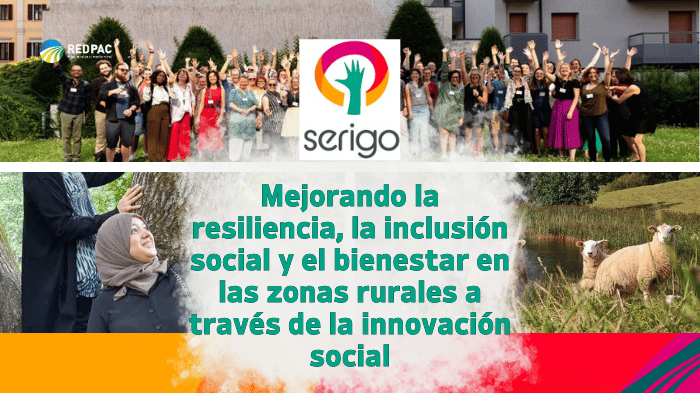
29 de July de 2024
Dinamización rural
Innovación
Its actions are based on a key idea: community-based participatory research. Interaction with stakeholders takes place through the so-called "Community of Practice," a group that catalyzes efforts and initiatives.
- The "SERIGO" initiative was born from the "Horizon Europe Program" to promote social inclusion in rural communities through social innovation.
- Spain is part of the project through the University of Vigo
The unequal development of urban and rural areas affects the livelihoods and general well-being of people in both populations, with particular emphasis on rural areas.
Hence, a series of educational institutions and those from the agricultural and rural world have joined forces to launch a project that takes action to promote social inclusion in rural areas: the "SERIGO" project .
Presented in May 2024, this initiative extends its actions until 2027 under the auspices of the European Union (EU) within its "Horizon Europe" program , which channels its R&D&I policies for the period 2021-2027.
These actions are embodied in a key idea: community-based participatory research . Thus, the objective of "SERIGO" is to promote innovation as a way to support social inclusion , particularly in rural communities.
In favor of community social integration
To assist these people, especially the most vulnerable, the project carries out three lines of action :
- Conducting community-based participatory research through case studies in Europe and pilot experiments in five EU countries: Austria, Slovakia, Slovenia, Estonia, and Finland. Participants are empowered through multi-stakeholder co-creation labs.
- Promote discussions and collaborations on the topics of resilience, social inclusion, and the well-being of vulnerable people in rural Europe with various stakeholders.
- Make recommendations on the development of social inclusion policies in rural areas.
Thus, its general objectives are:
- To name and study the factors that increase social exclusion , differences, and marginalization in different rural environments and in different forms of vulnerability.
- Examine economic solutions for social innovation and their ability to promote inclusion and equity.
- Identify potential problems and compare social economy practices and policies in the EU at national, regional, and local levels.
- Design five pilot experiments that implement innovative social solutions to support vulnerable groups, integrating them into the community and creating an active connection between the two.
- Co-create and validate recommendations on policies to assist vulnerable groups, as well as on how to create an enabling framework for greater social innovation in rural areas.
The pilot projects consist of concrete actions in specific locations, but are still in their early stages. For example, in Carinthia (Austria), the project is offering literature classes and workshops to refugee mothers, thereby contributing to their integration into rural Austria.
Another pilot experiment in action is the creation of an energy community and skills development initiatives in Ostrovany, Slovakia, but SERIGO will provide more details on the outcome of these initiatives in the future.
Phases and profiles sought
The project consists of five phases, each of which will involve interaction with stakeholders. The project is currently in the first phase , developing the conceptual framework , and will move on to the analytical framework, fieldwork, pilot experiments, and the generation of good practices and policy recommendations.
Interaction with stakeholders takes place through the so-called "Community of Practice ," a dynamic grouping that catalyzes efforts and initiatives to share and exchange knowledge. It connects individuals and organizations from the EU and neighboring countries to co-create and validate research findings and potential policy recommendations, enabling peer learning.
“SERIGO” requires a wide range of profiles in policy (social innovation, economics, rural development, etc.), science (scientists, academics, research communities), social economy (non-profit organizations, cooperatives, mutual insurance companies, foundations, etc.), civil society (NGOs, LAGs, associations of vulnerable groups, etc.), education (educational institutions of all kinds), and society (individual citizens in rural areas). Thus, any person or entity that believes they could be useful to the project and become part of the “Community of Practice” can fill out a short form to begin a dialogue with the organization.
Project participants
The "SERIGO" project, coordinated by the University of Eastern Finland , has 17 partners from 11 European Union countries : the University of Vigo (Spain), the European Association for Innovation in Local Development (AEIDL) (Belgium), the Federal Institute for Agricultural Economics , Rural and Mountain Research (Austria), Wageningen University (Netherlands), Eurac Research (Italy), Carinthia University of Applied Sciences (Austria), Galway University (Ireland), Tallinn University (Estonia), the Centre for Social Innovation (ZSI) (Austria), Eskisehir Osmangazi University (Turkey), Faculty of Social and Economic Sciences, Comenius University in Bratislava (Slovakia), the GAL LEADER Association of Võru County (Estonia), ProAgria Eastern Finland (Finland), Diakonie de la Tour (Austria), the PRIZMA Foundation (Slovenia) and the city of Ostravia (Czech Republic).









